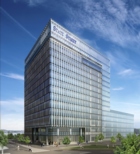Simmtronic wins major lighting-control contract at Canary Wharf

Every luminaire in this building under construction in Canary Wharf will be controlled individually by a control system being installed by Simmtronic.
Simmtronic has won a contract to supply fully addressable lighting controls for a new building in London’s Canary Wharf. Every luminaire in the 28 000 m2 of 20 Churchill Place will be under DALI control. In addition, all emergency luminaires will incorporate DALI control inverters to make possible automatic testing. The contract was awarded by PIP Electrics. M&E consultant Hilson Moran specified an energy-saving lighting-control scheme, predominantly presence based and with daylight linking on the perimeter rows of luminaires. Offices and trading floors have a combination of recessed modular fittings and suspended direct/indirect luminaires. For the recessed modular fittings, DALI lighting control modules with nine outputs are being configured one per port to eliminate sub-addressing. These controls can report failures of ballasts and lamps. The suspended luminaires incorporate a linear lighting control scheme, fed from one end, and will therefore have DALI hub lighting control modules with sub-addressing of individual luminaires. The building is due for completion in Autumn 2008. Prudential Retirement Income has taken long leasehold interests on it to consolidate its three current London offices into a single headquarters by early 2009.
For more information on this story, click here:
Jan 08, 140 Related links:


